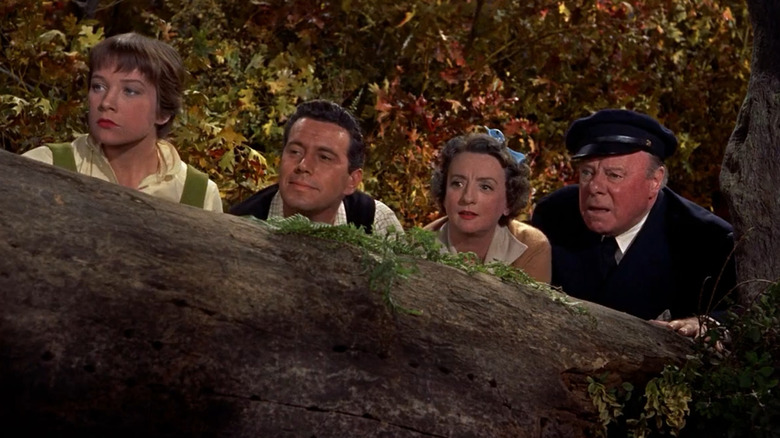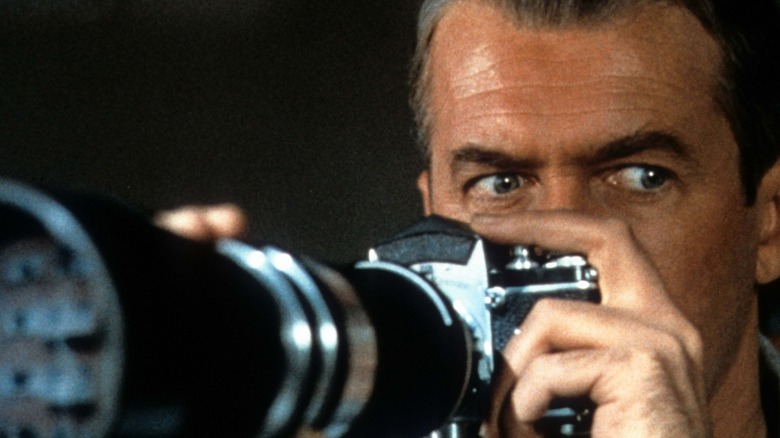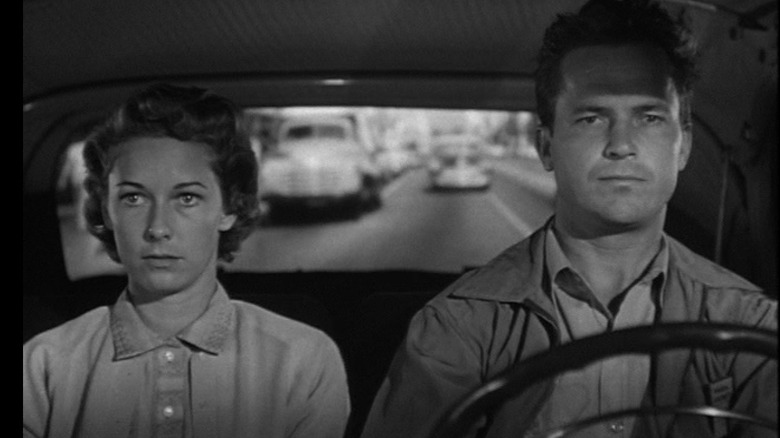The Prototype For Alfred Hitchcock Presents Was A Forgotten Box Office Flop
Did you know that Alfred Hitchcock made a film starring Shirley MacLaine and John Forsythe? Did you know he made a broad comedy? Did you know he shot an entire film in Craftsbury, Vermont?! Well, I guess the last one isn't so shocking. And "Mr. and Mrs. Smith" (no not that one, or that one either!), Hitchcock's Carole Lombard-starring screwball comedy from 1941, is quite well-known and liked.
But I'm not talking about "Mr. and Mrs. Smith." I'm talking about the other comedy made by the master of suspense. 1955's "The Trouble With Harry" represented several firsts for Hitchcock — his first dark comedy, the first film he made after obtaining American citizenship (he had been living and working in the country for 16 years by that point), and the first film he made after commencing production on "Alfred Hitchcock Presents." That series quickly became popular with audiences and was cemented in short order as an American institution, but while in development on the first batch of episodes, that wasn't a sure thing. Television wasn't just a nascent medium at the time; it was viewed dubiously by many, and by others outright despised. Here is a typical quote from the era, from the 1950 graduation speech by the president of Boston University:
"The most entertaining and popular shows of the 20th century were not poorly made, nor were they necessarily detrimental to society as mainstays of the culture. They were, however, usually void of thoughtful social content. Television often serves to distract [...] If the television craze continues with the present level of programs, we are destined to have a nation of morons."
The commercial failure of "The Trouble With Harry" was the biggest blow to Hitchcock's confidence in the fledgling series. Why? It was all in the jokes ...
The humor of the macabre
Hitchcock may not be regarded primarily as a humorist, but a wicked, cheeky sense of humor pervades even his darkest and most perverse projects. He even stated in a 1969 interview with Bryan Forbes, "Every film I make is a comedy!" It may be hard to spot the comedy because it was so often intertwined with, and in fact used to heighten, the suspense. Take the scene in "Rear Window" where Jeff (Jimmy Stewart) staves off the advance of the villainous Thorwald (Raymond Burr) by grabbing and flashing camera bulb after camera bulb. Rather than closing his eyes and making his move toward Jeff, Thorwald continually takes off his glasses, puts them back on, and rubs his eyes with a shocked expression. It's funny!
In John McCarty and Brian Kelleher's book on "Alfred Hitchcock Presents," "An Illustrated Guide to the Ten-Year Television Career of the Master of Suspense," the authors quote Hitchcock describing his understated, sinister comic stylings as "the humor of the macabre." He found "such humor" to be "typically English," offering as an example, "It's like the joke about the man who was being led to the gallows, which was flimsily constructed, and he asked in some alarm, 'I say, is that thing safe?'"
If you've seen more than a few episodes of "Alfred Hitchcock Presents" you'll know it's far more straightforwardly funny than most of Hitch's films. Even funnier, sadly, than "The Trouble With Harry," a film that was meant only to be funny, whereas "AHP" is a horror-comedy that leans largely on the horror end of the formula. So what went wrong?
The trouble with Alfie
The trouble with "The Trouble With Harry" couldn't have originated with its premise. It has a great one. The ensemble film sees nine denizens of a charming Vermont hamlet (the film was shot on location in Craftsbury, Morrisville, and Barre at the peak of the autumn foliage turn) each briefly take the blame for, and try to dispose of, a body found on a hillside. Joining MacLaine and Forsythe, early into but already showing the promise of their equally illustrious careers, was a brigade of veteran bit players, including Edmund Gwenn, Mildred Natwick, Mildred Dunnock, Jerry Mathers, and Royal Dano. It's essentially a comedy of errors, in which characters mis-accuse, misperceive, and misremember their way into a delightful tangle.
The performances range from good to superb, the score by Bernard Hermann is of course excellent, the location photography by Robert Burks is sumptuous, and actually, it's pretty funny! The film fell out of circulation for over 30 years after a dismal box office performance but was revived in the '80s as part of a "greatest of" box set, and is easy to seek out now. At the time, though, critics seemed to judge the straddling of the line between humor and horror to be more of a falling off the tightrope into an alligator tank.
To Hitch, the problem was the dry, understated, distinctly British sense of humor. "It's the spirit of the whole thing," he's quoted as saying in the McCarty and Kelleher book. Though "The Trouble With Harry" gave him every reason to worry about "Alfred Hitchcock Presents," it was a hit from the very first episode (the excellent Samuel Blas adaptation "Revenge"). If the American "The Office" remake taught us anything, it's that British humor may just translate better on the small screen.


